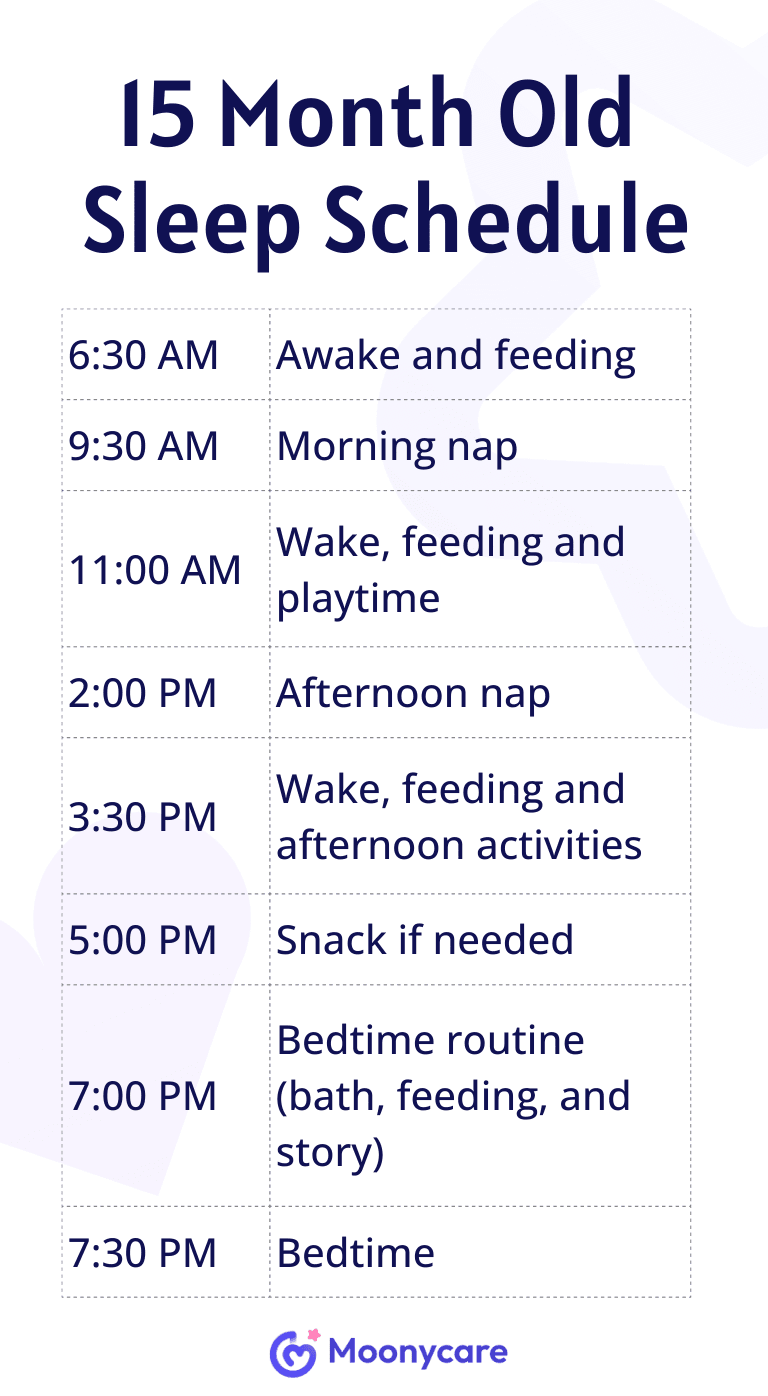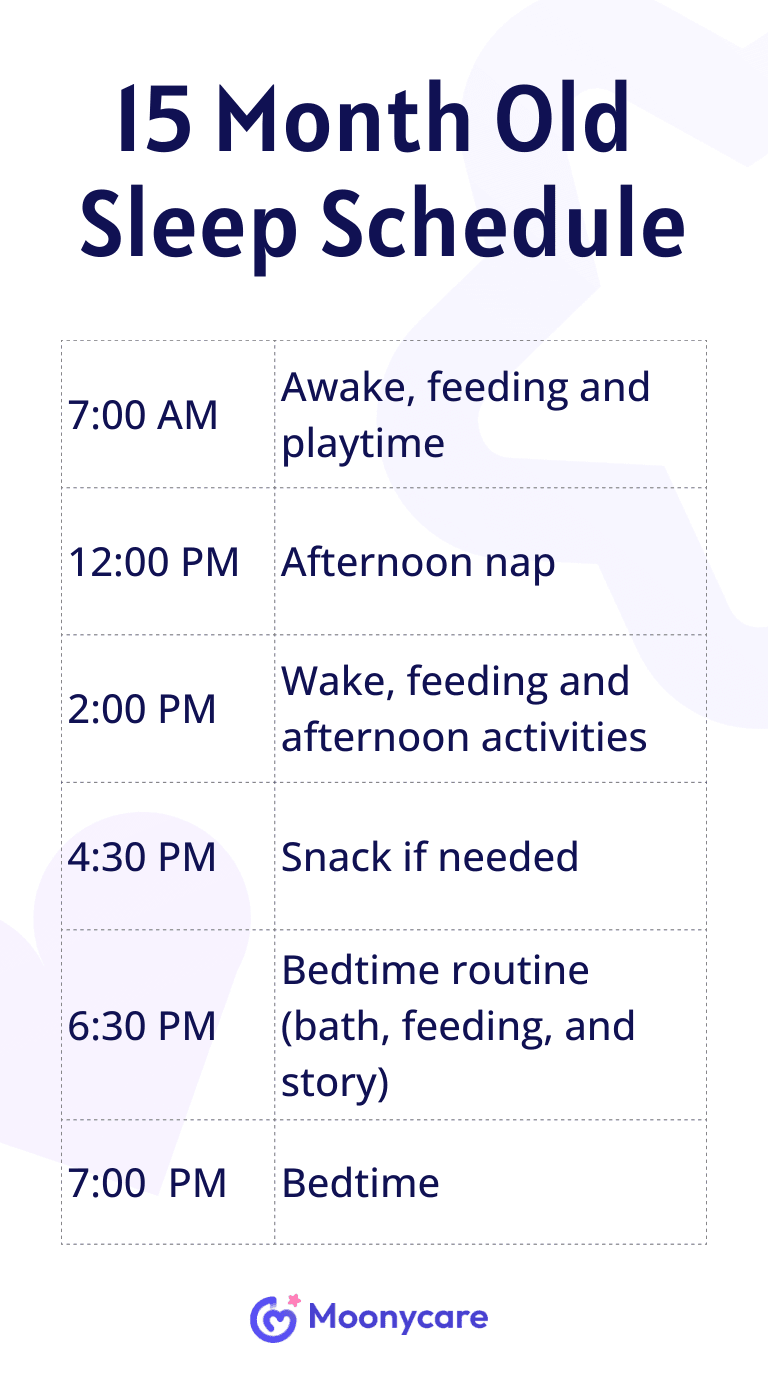

Creating a sleep schedule for a 15-month-old is an essential part of ensuring they get the required rest as they continue to grow and develop. At this age, your toddler is likely becoming more active, and their sleep patterns will be adjusted accordingly. Here's a comprehensive guide to understanding and managing your 15-month-old's sleep, focusing on the unique aspects of their sleep requirements, including wake windows, naps, and bedtime routines.
In addition, for the sake of scientific and effortless raising babies, you can use Moonycare app, which can customize a sleep schedule to your baby with appropriate wake windows between sleeps. And it is developed based on your baby’s sleep patterns, such as awake time, bedtime and nap times.
IN THIS ARTICLE:
What are Wake Windows for a 15 Month Old?
A Sample Sleep Schedule for 15 Month Old Babies
How Much Should a 15 Month Old Sleep?
How Long Should a 15 Month Old Nap?
How Many Naps are Suitable for a 15 Month Old?
Is 15 Months too Early for One Nap?
What Time Should a 15-Month-Old Go to Bed?
Can a 15-Month-Old Baby Sleep Through the Night?
Can you Sleep Train a 15-Month-Old?
Is there Sleep Regression for 15 Month Old Babies?
What are Wake Windows for a 15-Month-Old?
At 15 months, wake windows, the periods of time your child is awake between sleep, are different based personal situation. These intervals are crucial for balancing activity and rest, helping to avoid being too tired, which can make it harder for your child to fall asleep.
Two-Nap Schedule Wake Windows
For toddlers still following a two-nap schedule, their wake windows are typically between 3 to 4 hours:
-
Morning Wake Window: About 3 hours after waking up.
-
Afternoon Wake Window: About 3 to 4 hours after the first nap.
-
Evening Wake Window: Around 4 hours before bedtime.
This schedule ensures that your child has balanced periods of sleep and wakefulness, reducing the chances of them becoming overtired or under-stimulated.
One-Nap Schedule Wake Windows
For toddlers who have transitioned to one nap, the wake windows are longer, usually around 5 hours:
-
Wake Windows 1: About 5 hours after waking up.
-
Wake Windows 2: About 5 hours after napping.
A single, longer nap in the middle of the day supports your child's growing need for sustained awake periods while still ensuring they get adequate rest.
Sample 15-Month-Old Sleep Schedule
Your 15-month-old's sleep schedule will depend on whether they are taking one or two naps. Below are examples of both schedules:
Two-Nap Schedule:

One-Nap Schedule:

Both schedules are designed to optimize your child's sleep and wake periods, providing the right balance of rest and activity to support their development.
How Much Should a 15-Month-Old Sleep?
A typical 15-month-old requires about 11 to 14 hours of sleep in a 24-hour period, including 10 to 12 hours of sleep at night. Keep in mind that individual sleep needs can vary, so your toddler might need slightly more or less sleep.
How Long Should a 15-Month-Old Nap?
If your toddler is still napping twice a day, each nap might last around 60 to 90 minutes. If they've moved to a single nap, expect it to last longer, typically between 2 to 3 hours. The goal is to ensure your child gets enough rest during the day to avoid overtiredness, which can interfere with nighttime sleep.
How Many Naps are Expected for a 15-Month-Old?
It is up to your baby's liking. Many 15-month-olds are in the process of transitioning from two naps to one. Some might still benefit from two shorter naps, while others may thrive with one longer nap. Pay attention to your child's cues and adjust their schedule as needed. If they're resisting the second nap or having trouble falling asleep at night, it might be time to transition to one nap.
Is 15 Months too Early for One Nap?
The transition to one nap can happen anytime between 12 and 18 months, and for many toddlers, 15 months is the right time to make the switch. Signs that your child is ready for one nap include difficulty falling asleep for the second nap, shortened nap times, or trouble falling asleep at bedtime. If these signs are present, try transitioning to a single nap and see how your child adjusts.
What Time Should a 15-Month-Old Go to Bed?
When it comes to the ideal bedtime for your 15-month-old, aiming for a window between 7:00 and 8:00 PM is generally recommended. This timing helps baby to distinguish with day and night, and ensures to get a restful night's sleep. If you notice that your child is having trouble settling down for the night or waking up unusually early, adjusting their bedtime by 15 to 30 minutes can help. Moving the bedtime slightly earlier or later can help match their sleep patterns more closely with their internal biological clock, leading to smoother transitions to sleep and more consistent wake-up times.
Can a 15-Month-Old Baby Sleep Through the Night?
Yes, many 15-month-olds can sleep through the night, typically for 10-12 hours. However, if your child is still waking up, it could be due to hunger, discomfort, or habit. If night wakings continue, consider reviewing their daily routine, sleep environment, and possibly incorporating sleep training techniques.
Sleep Training a 15-Month-Old
If your 15-month-old is having trouble sleeping through the night or resisting bedtime, sleep training can be helpful. At this age, your child is more aware and may protest more during sleep training, so consistency and patience are key. Methods such as the Ferber method (gradual extinction) or the Chair method (gradual fading) are commonly used at this stage. Establishing a calm, predictable bedtime routine is also crucial for successful sleep training.
Sleep Regression of a 15-Month-Old
Around 15 months, some toddlers experience a sleep regression, which can manifest as increased night wakings, difficulty falling asleep, or resistance to naps. This regression is often linked to developmental milestones such as walking, talking, or teething, changes in sleep patterns, environmental factors, cognitive development or health issues. Maintaining a consistent routine and offering patient comfort during this time can help your child navigate this phase.
15-Month-Old Sleep Tips
Here are some tips to help ensure your 15-month-old gets the sleep they need:
-
Establish a Routine: Consistency is key. Create a bedtime routine that includes calming activities like a bath, reading, or quiet play.
-
Optimize Sleep Environment: Ensure your child's sleep environment is dark, cool, and quiet. White noise machines can be helpful to block out background noise.
-
Monitor Diet: A well-balanced diet can impact sleep. Ensure your toddler is eating nutritious meals and snacks throughout the day.
-
Physical Activity: Encourage plenty of physical activity during the day to help your child burn off energy and be ready for sleep.
-
Stay Flexible: Be open to adjusting your child's sleep schedule as they grow and their needs change.
























